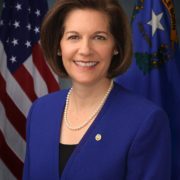Having been born and raised in Las Vegas, I’m so thrilled to see our community’s growing diversity. I’ve watched an engaged and thriving Asian American and Pacific Islander (AAPI) community take root and enrich my hometown. So many of these proud Nevadans are small business owners, educators in our schools and advocates for a stronger and more diverse Silver State.
At a recent AAPI community business roundtable hosted by the Asian Community Development Council, UNLV student Caitlin Gatchalian asked me about environmental sustainability and how young Nevadans can make their voices heard in the fight for their future. As a young Filipina, she wanted to make sure climate change was at the forefront of the issues I’m fighting for in the Senate on behalf of Nevadans.
And she’s not alone in her concern about the disproportionate impacts climate change is having on communities of color, and the overall harm it’s bringing to our planet. Here’s why: while climate change is already impacting all Americans — including through increased air pollution, extreme weather and dangerous heat waves — these impacts are not equally shared among all communities.
Studies have shown that API Americans hold a higher risk of being exposed to harmful substances in the air they breathe. In fact, twenty percent of Asian Americans live in counties with poor air quality. Therefore, this issue is of particular importance to AAPI communities throughout the U.S. Data has shown that many are considerably more likely to prioritize environmental protections over economic growth. Seventy-one percent considered themselves environmentalists back in 2013, a staggering 30 points higher than the national average at the time, according to a series of National Asian American Surveys.
Nevada communities, including its AAPI members, are already suffering from the impacts of climate change. In Clark County, we have an F rating from the American Lung Association for particle pollution and high ozone days. For the 25,000 AAPIs living in poverty in Nevada, deteriorating urban housing only increases their exposure to air pollution and lead poisoning. And that exposure has serious consequences. Air pollution is the number one environmental cause of death across the world, responsible for more fatalities annually than vehicle crashes. And Asian Americans are exposed to air pollutants linked to cancer and other serious health effects at a rate even higher than Hispanic populations and only just below African Americans. As our climate continues to warm, these dangerous pollutants will only increase, placing a particular burden on our at-risk communities.
The time to act on meaningful legislation to ensure protections for communities of color, including AAPI communities, is now. I’m taking immediate action in the Senate. I’ve introduced the GEO Act, which promotes the growth of geothermal energy to power our communities and invest in green jobs of the future. Nevada is a leader in the production of renewable energy, and I’m excited this legislation invests in innovation, sustainable job growth and a healthier planet. I also recently cosponsored the Climate Change Health Protection and Promotion Act. This legislation would support state and local health departments in conducting research to develop plans so that our communities can better handle the health impacts of climate change. Additionally, to help further Nevada’s green energy production and create sustainable jobs, I cosponsored the Clean Energy for America Act. This legislation would reduce carbon pollution over the next decade by incentivizing clean energy and new technologies that employ hard-working Nevadans. I’ll also continue to support state-level proposals, like the recent ballot question to increase Nevada’s renewable energy portfolio standard to 50 percent by 2030. This vote, and the recent passage of companion bills in the Nevada legislature, mark an important step to significantly reduce pollution, spur job growth and improve the health of communities across Nevada. All of these initiatives will help address climate change and protect Asian and Pacific Islander Americans from the negative health outcomes of climate change.
I’m grateful for organizations working to bring the voices of AAPI Nevadans to the table on issues like climate change at the local, state and national level. The Asian Community Development Council (ACDC) does incredible work to organize and boost civic engagement among the many communities that make up the diverse Asian and Pacific Islander experience in Las Vegas. From educating the community to turning out the vote and hosting candidate forums, ACDC is laying critical groundwork to secure political representation for AAPI Nevadans. In some Clark County state assembly districts, Asian Americans comprise close to 25 percent of the electorate. Amplifying AAPI voices through organizations like ACDC ensures that they have a seat at the table to confront the issues impacting their communities. Now, as the fastest-growing demographic in Southern Nevada, totaling over 220,000 people in the state, the AAPI community represents a crucial voice in fighting for action on the climate crisis.
I would not be in Washington today, representing the great state of Nevada as its first female Senator, without the support of Nevada’s AAPI community. And I’m in Washington fighting on issues like climate change that impact our communities. I’m doing everything in my power to listen, bring stakeholders together and fight for policies that protect our planet. There is no Planet B. We will only stem the climate crisis if we come together and fight for environmental justice and a greener future for all.
***
Born and raised in Las Vegas, Catherine Cortez Masto has spent her career fighting for Nevada’s working families. She served two terms as Attorney General of Nevada and in November 2016, she made history by becoming the first woman from Nevada and the first Latina ever elected to the United States Senate.







